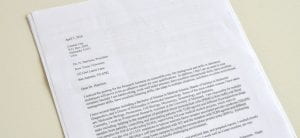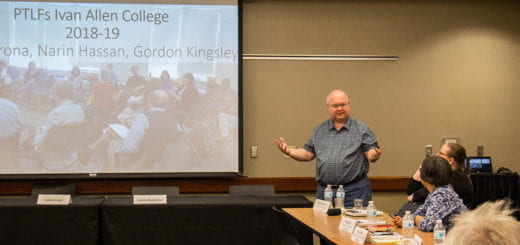Making a Good First Impression with a Cover Letter
Your cover letter is the first opportunity to present a case that you are the ideal candidate for a position and can influence how a search committee approaches your application materials. Each cover letter should be tailored to a specific job position and institution.
Purpose
The cover letter serves to persuade the search committee to read and consider your CV with interest. In 1-2 pages, your letter should:
- State your interest in a specific position or institution
- Provide information on your academic status and expected date of availability
- Highlight and elaborate on a subset of specific skills and experiences in a more detailed narrative
- Explain how those skills and experiences are aligned with the requirements of the position
- Demonstrate how your values and goals are aligned with the program/department/institution
- Demonstrate your writing skills
- Contain key words from the job posting
Audience
The search committee will be your primary audience. Your letter will be most effective if you demonstrate to the committee members that you: 
- Read the job posting and meet the minimum requirements
- Explicitly connected your skills and experiences to the goals for the position/institution
- Considered the nature of the position (e.g. tenure track v. non-tenure track) and the institution
- Defined your niche in your field and distinguished yourself from other candidates
Content
Intro
The introduction should be no longer than a few sentences and, at minimum, should include:
- A first sentence that identifies the position to which you are applying
- Your current academic status and your projected completion date or the date of availability
- Information on how you learned about the position and what interested you in the job
- A thesis statement that previews your qualifications described in the body of your cover letter
More importantly, you should use language that clearly communicates your excitement and enthusiasm for the position while remaining professional.
Body
Each paragraph in the body is typically structured as a claim about one of your skills and experiences (what you did), evidence of your work to support the claim (how you did it and the end result), and an explanation of the significance (why you did it) and relevance to the listed requirements of the job. What you emphasize and the order that you present your experiences should depend on the type of institution to which you are applying. Your skills and experiences generally fall into three categories: 1) research, 2) teaching, and 3) service.
 1) Research
1) Research
While your research statement, which is also included in an application packet, gives a broader overview about your research interests and the progression of your work, the cover letter gives a snapshot of a specific project or two. The first project to highlight is your dissertation or your most recent research. If you are applying to a research-focused school, mention a second related project or outline future work. In the paragraphs for each project, briefly summarize the research, describe the outcomes or expected outcomes, and explain how your work contributes to your field and to the department’s or institution’s program of research. Avoid jargon or make sure to define terms because search committee members can be from outside your discipline.
 2) Teaching
2) Teaching
In the teaching paragraph, define your teaching approach in 1-2 sentences. Your teaching statement elaborates on this so more details in the cover letter are unnecessary. Next, connect your teaching philosophy to an experience, or two if you are applying to a school that emphasizes teaching and mentoring. These examples should demonstrate what your teaching approach looks like in practice. Teaching-oriented schools want to see how you foster relationships with students and create quality learning experiences. Include course evaluations in your supplemental materials as evidence of your effectiveness as an instructor and refer to these in your teaching paragraph(s). If you can, also explain how your teaching relates to your research. This might be more important for research-oriented schools. If you have no experience teaching, describe any training or mentoring experiences and how your development from these situations can contribute to your teaching responsibilities. At the very least, explain how your own academic training and research can help you teach courses within your field.
 3) Service
3) Service
Service activities might be more important to smaller schools or teaching colleges, where faculty are expected to contribute more to departmental administration. You might consider focusing on your service experiences even more if you are applying to non-tenure track positions that tend to be administrative in nature. When writing the narrative for your service work, connect your activities to your research and teaching as much as possible. Like the other paragraphs in the body, provide evidence for your involvement in service and always refer to how these activities demonstrate your ability to contribute to the future development of the position and the program/department/institution.
What you choose to feature should clearly demonstrate how you can enhance the institution and distinguish you from other candidates. Even if your background does not perfectly correspond to the posting, you can argue how your unique, unconventional qualifications can contribute to the broader values and goals of the institution. Also, highlight any special recognition or awards for activities in any of the above categories.
Conclusion
Your concluding paragraph should:
- Summarize your fit and previously mentioned qualifications in a sentence or two
- Reiterate your interest and enthusiasm
- Thank the search committee for their time and consideration
Style Tips
- Format the cover letter like a formal business letter, with “Dear Dr. [Chair of Selection Committee]” or “Dear Selection Committee Members” as a salutation.
- If your school permits, you may print on official Georgia Tech letterhead. Use clear and concise language and action words whenever possible.
- Remain formal and professional but still convey genuine interest in the position and institution, conviction and confidence in your work, and passion for your discipline and chosen career.
- Make sure that you have proofread your letter several times.
Additional Resources
Schedule a consultation with CTL staff to get feedback on a draft of your cover letter.






